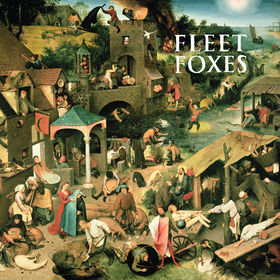Released 3rd June, 2008.
You’re aware immediately of experiencing something quite different after the first few notes. The opening lines of the opening song of Fleet Foxes eponymous debut album Sun It Rises are, quite jaw droppingly, “Red squirrel in the morning, red squirrel in the evening..I’m coming to take you home”. Whilst taken out of context the words read like the couplets of a toothless Kentuckian weaving his way back from a still, within a few minutes your consciousness tells you that the journey here is fuelled by something far more potent than backwoods moonshine.
The epiphany though is in fact far removed from the band’s context, being the simple, graceful re-emergence of the voice as a lead instrument. Of course there are other things making noise on this record, some of which sound like they may have been gathering dust in a shack since before Khe Sanh, but few records of recent times have been so enamoured with the four-part harmony than this.
In a strange way, this is a record you wanted to find fault in given the ecstatic reception from the likes of Pitchfork and a Metacritic rating which placed it ahead of Portishead, Hercules and Love Affair and golly gosh, the guys who just owned the keys to Americana, The Hold Steady. Maybe it was the mean-ness of the human spirit, or more likely the cynicism of spending a lifetime underwhelmed by the over eulogised. Whatever the reason, it’s always therapeutic when this bitterness can be set aside by music which treads its own path but is still meant to be engaged with, to be savoured – rather than spat out – by the audience.
From Seattle, the quintet signed to Sub Pop, the Foxes probably the label’s first signings to have grown up doting on their parent’s Crosby Stills and Nash, Beach Boys and Buffalo Springfield collections, a generation for whom punk and eighties hardcore are simply Wikipedia entries. This was especially fascinating when you considered that lead singer Robin Pecknold was barely in his twenties, meaning that at high school he was presumably being exposed daily to Limp Bizkit and Fiddy – but it’s impossible to deny the authentic reverence on display for these ancient influences.
With the band possessing a skill in arrangement which given their average age is clearly a natural one, remarkably all these bygone voices find their sibilance, melting together into a cocktail of classic sixties psychedelia and seventies MOR, dusted with a pastoral gentility, proudly rendered folk avatars and that beguiling harmonic interplay. Attempts at comparison – at least with contemporary artistic output – were pointless. The closest aphorism would be that both philosophically and audibly this is the soundscape that M.Night Shyamalan’s The Village score should’ve been.
Whilst this clumsy analogy is a simple one to make, the dimensions on show in terms of songwriting depth and quality are a little difficult to fully comprehend. Here and there are littered gems of almost unimaginable beauty – He Doesn’t Know is a monumental piece of opalescent, tambourine wielding Roy Orbison-esque pop, sounding like a strange Appalachian cousin of The Shins – whilst Meadowlark reaches a sad, but not miserable apex which few artists have achieved in their dreams, yet alone on their first album. It’s equally difficult to reconcile Pecknold’s claim that these are merely songs written and recorded in people’s bedrooms with the panorama they create. Thematic talk about mountains and woods confers an obsession with the elemental, but the melodic backdrop lacks the unpredictability of nature – as an example take White Winter Hymnal, built on the simplicity of a capella verses and spanner-tight melody which the Wilsons would’ve been proud of. And yet in the face of this almost utopian backdrop, our jaded western countenances begin to search for darkness at the edges to satisfy, and accordingly here the moments of genius – genius – are revealed behind this veil. In the gospel and flute body of Your Protector finally the devil gets to run free, the subject preparing to meet the truth or consequences of some unspecified pact, whilst on Blue Ridge Mountains Pecknold pleads with a sibling to not fulfill a stark family legacy, whilst asking darkly of himself “Terrible am I ?”. Finally, as if in recognition that death stalked the countryside of our grandfather’s grandfathers like a familiar companion, closer Oliver James is the ghostly story a child’s drowning.
In an entertainment world obsessed with keeping things “real” – whilst ignoring the absurdity of comparative judgement – doubters inevitably surfaced, the see-saw of critical acclaim always having it’s downswing. It was in fairness a pendulum Fleet Foxes never felt they’d have to worry about, but one that this stunning collection of songs made inevitable.


1 Comment
Comments are closed.